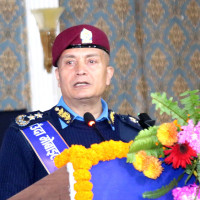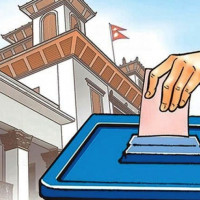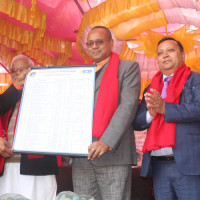- Thursday, 22 January 2026
Republic Nepal has heralded new era of women empowerment
By A Staff Reporter,Kathmandu, May 26: Prominent women personalities have expressed their views about women’s empowerment status in Republic Nepal.
Ashta Laxmi Shakya
CPN-UML Vice-Chairperson and former Chief Minister of Bagmati Province Ashta Laxmi Shakya said this monumental shift marked the end of the previously entrenched hereditary ruling system, heralding a new era for the nation, she added.
“The primary achievement of this new system is the empowerment of the people, who now proudly identify as sovereign citizens of the federal democratic republic nation,” said Shakya.
Subsequently, the people’s power has prevailed, fostering their political, economic, social, and cultural rights, she said adding, “The nation has embraced an inclusive constitution, ensuring the rights for all citizens.”
She highlighted the freedom of expression and political freedom as crucial elements of the republic.
“Under the new system, individuals from all walks of life, irrespective of gender, caste, or community, have equal opportunities for political participation and governance,” she added.
While acknowledging the progress made, Shakya expressed concerns about political instability, governance issues, anomalies and ongoing blame games and differences among political parties. She emphasised that it is the shared responsibility of political parties, lawmakers, civil society, and the public to safeguard these hard-earned achievements.
Pushpa Bhusal
Nepali Congress leader and former Deputy Speaker of the House of Representative Pushpa Bhusal has said that the role and status of women have undergone a massive transformation, and their collective rights have been secured. They are aware of their rights and have stood up for social change.
The representation of women has increased since the establishment of the Federal Democratic Republic in Nepal. However, the government has not given preferences for the actual empowerment of women. The success of federalism can be judged only by framing a woman-centric political economy.
The government should work to empower all those women who are still lagging behind socially, economically, and politically. Women’s access to social, economic and political opportunities will allow them to increase their productivity and their substantial contribution to nation-building.
Pampha Bhusal
CPN (Maoist Centre) Vice-Chairperson, Pambha Bhusal, hailed the system for demolishing the autocratic ruling system and enabling people’s representatives to write the constitution and govern the nation.
She however said the political transformation alone cannot safeguard the system unless every section of the society feels that there is a state for the people to look after them.
She also cautioned against attempts to reverse the political changes. “Forces seeking reversal of changes might not succeed but regardless of ideological differences, political parties should unite and devise an integrated plan for economic, social, and cultural transformation to strengthen the system.”
Bhusal urged for further strengthening of the historic achievements instead of questioning their necessity.
“The historic achievements should be further strengthened instead of questioning their essentiality. We have the responsibility of passing on the importance of the republic to the new generation, emphasising that regression is not an alternative,” she added.
Dr. Kaushila Rishal
Dr. Kaushila Rishal, a member of Academic Council of Nepal Academy, said that there have been a lot of changes in women’s awareness level. The system has contributed to raising social awareness about gender equality and women’s rights at every local level. Civil society organisations, media, and educational institutions have played crucial roles in advocating for women’s empowerment, challenging traditional gender norms, and promoting gender equality.
But still, the patriarchal thinking has to be changed to bring more women to the policy-making level, she said. Women are still facing violence and discrimination and that should be stopped through the policy and programmes, she added.
Babita Basnet
Babita Basnet, a senior journalist, said that the republican system has paved the way for significant legal reforms to promote gender equality. Nepal’s new constitution, adopted in 2015, guarantees equal rights for women and prohibits discrimination based on gender. It includes provisions for proportional representation of women in various political bodies, ensuring their participation and influence in decision-making processes, she said.
After the adoption of the republican system, women can dream freely about what they want, even to be the head of the country, which was not allowed before. Girls are preparing themselves to handle the top position in the country. This is one of the greatest psychological changes and confidence among women.
The republican system has resulted in increased political participation of women (33%). The constitution mandates that at least one-third of the members in the federal, provincial, and local government bodies should be women.
This quota system has led to a significant increase in the number of women holding public office, including in the parliament, provincial assemblies, and
local governments. The system has also helped to address the issue of gender-based violence more effectively, Basnet said. But still, many policies and plans are not being implemented properly. The big achievement should be institutionalised. Continued efforts are required to ensure the full realisation of gender equality and women’s rights in Nepal and we can see a different Nepal in another 10 years.
Namrata Sharma
Namrata Sharma, a senior journalist and women’s rights activist, said that Nepal has come a long way from Absolute Monarchy to a Federal Republic country. There have been a lot of changes in this process. A lot of laws have been amended and new laws have been promulgated. There have been a lot of laws prepared which are pro-women and socially marginalised populations. Efforts have been made to establish equality in the country, Sharma said.
“There are reservations in the educational sector and civil services offered by the government so as to integrate gender equality and social inclusion (GESI) into government systems and in all other public places,” she added.
However, the feudal and patriarchal mindsets are still prevalent in people’s minds. Nepotism is still a reality in Nepal. One main provision of the Constitution of Nepal is to design an electoral system that addresses the commitment to integrate GESI into the leadership positions of the country so as to have policymakers who address these issues well.
However most of the time the political parties give tickets under First Past the Post electoral system to men while spouses of the high-ranking political party leaders or women and people from marginalised communities who are close to them are included in the Proportional Representation list. This goes against the spirit of the Republic system, she stressed.
The lesson learned in Nepal related to institutionalising the country as a republic state is that just having laws that are pro-women and marginalised communities is not enough. There needs to be people with knowledge and commitment towards these issues. There also needs to be a transparent and simple process through which people get access to the rights ensured by the Constitution.
















